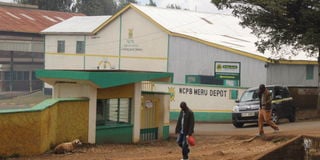Farmers decry ‘tedious’ process of getting subsidised fertiliser

National Cereals and Produce Board (NCPB) depot in Meru. Farmers want cooperative societies to be allowed to distribute the subsidized fertilizer.
Farmers in Meru have decried the bureaucratic process of distributing subsidised fertiliser, saying it is tedious and the depot in Meru town is too far for growers in remote parts of the county.
Before getting the input, farmers must register with the National Cereals and Produce Board (NCPB) and produce evidence that they own farms where they intend to use the fertiliser.
Besides this process, it costs, for example, Sh100 to transport a 50kg bag of fertiliser to Nkubu town, 16km from Meru, while farmers in Maua, some 60km away, pay up to Sh200 per bag.
“It doesn’t make sense for us to buy fertiliser at subsidised rates and then we incur further expenses transporting it to our farms,” said Mr Joseph Kimathi, a farmer in Nkubu.
“They should make the process easier and bring it as close as possible, otherwise the rains will come before we plant our crops.”
Farmers’ cooperative societies have waded into the controversy and called on the ministry to trust them to deliver the crucial input to growers.
Because farmers don’t have money, having spent it to pay school fees for their children, they argued, the societies should be allowed to procure the input on their behalf, supply it at no cost and deduct the cost from farmers’ proceeds when they harvest their crops.
They rejected the proposal to channel fertiliser through the NCPB, saying this would not help coffee and tea farmers.
Mr Josephat Kwiriga, executive officer at the Mikumbune Coffee Cooperative Society in Imenti South, said channelling the subsidy through the NCPB will draw cartels that operate in the sector and undermine the programme.
He said the ministry should trust societies and allow them to buy fertiliser and supply it to farmers in villages.
“The government should adopt a new strategy, because if we take it through the old channels it will not help growers,” Mr Kwiriga said.
“The same cartels that operated in previous subsidies will buy the commodity in bulk, repackage and sell it at inflated prices. This will sideline the small-scale farmer targeted for the subsidy.”
He added: “The government previously said we could not be trusted with the subsidy but they should get away from that. We are the only people who can help the farmers because we understand their problems.
“We have been giving them loans to pay school fees for their children and we know they have no money at the moment.”
Fertiliser for various crops should be distributed to societies dealing with those crops so that farmers can get it more easily, said Mr Douglas Mutugi, chairman of the Nkandone Dairy Farmers Society.
“The distribution should be done through the Kenya Tea Development Agency, cooperative societies for coffee and also dairy societies because these are the organisations that deal with the farmer directly,” Mr Mutugi said.
The release of subsidised fertiliser sparked uproar across the country, with farmers saying the government should change its delivery tack so that the input could have an impact.





